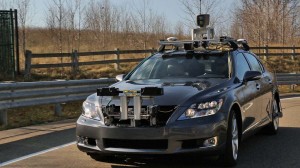It can spot a potential problem 500 feet away and tell the difference between a red and green light. It can anticipate a corner even before the driver turns the steering wheel. It’s designed to prevent a crash but can also make it easier to survive a collision even as it automatically calls for help.
Toyota’s Lexus luxury brand is giving the public a first look at its advanced active safety research vehicle at the annual Consumer Electronics Show in Las Vegas this week. Also known as the AASRV, it is designed to test and demonstrate a variety of automated vehicle safety technologies that could be used in production vehicles in the not-too-distant future, according to Toyota officials.
But unlike some prototypes, the AASRV is not designed to operate with complete autonomy. Mark Templin, the general manager of the Lexus brand, stressed that the goal is to engage and enhance a driver’s skills, rather than to turn motoring into a fully automated activity.
“In our pursuit of developing more advanced automated technologies, we believe the driver must be fully engaged,” explained Templin. “For Toyota and Lexus, a driverless car is just a part of the story. Our vision is a car equipped with an intelligent, always-attentive co-pilot whose skills contribute to safer driving.”
The concept behind the AASRV is to view traffic safety as a “holistic blend” of people, vehicles and the driving environment, Toyota said. The technology used in the safety vehicle is designed to act as a back-up to the driver from the moment a car is turned on until it is safely back home – or, in the case of a collision, through the time when rescue and response has occurred after a crash.
The safety vehicle incorporates a wide range of technologies to “see” what’s happening both on the road and inside the car. That includes:
- A roof-mounted, 360-degree LIDAR laser that can detect obstacles and other objects at distances up to about 230 feet;
- Three high-definition cameras capable of also spotting obstacles – as well as reading traffic lights – at up to 500-foot distances;
- Front and side-mounted radar to create a field of “vision” around the vehicle;
- An inertial measurement system that can determine how the vehicle is behaving, watching for skids or sudden driver inputs, for example; and
- GPS antennas on the roof help an onboard navigation system compare the vehicle’s motion to the road itself.
Today’s automobiles are coming loaded with more and more digital safety technology. Electronic stability control has been required by federal law since the start of the 2011 model-year and has been credited by the National Highway Traffic Safety Administration with already saving 1000s of lives.
New cross-traffic alert systems can spot an oncoming vehicle otherwise out of sight for a driver backing out of a parking spot. And a number of vehicles, including the latest-generation Lexus LS, are equipped with pre-collision warning systems that can alert a driver to a potential crash. The LS system can even bring the car to a stop if the driver doesn’t react in time – and it is designed to mitigate the impact if a crash is inevitable.
While the Consumer Electronics Show has traditionally focused on goodies such as televisions, smartphones and computers, it has seen a growing presence of automakers and vendors focusing on transportation technology ranging from infotainment to Intelligent Transportation Systems, or ITS.
The AASRV will participate in smart car research that could soon find vehicles communicating with a smart roadway infrastructure – and with each other. That could reduce the likelihood of collisions at blind intersections, for example, while also letting motorists know about problems ahead, such as slick roads, construction or traffic congestion.
Toyota noted it is one of eight automakers participating in the Crash Avoidance Metrics Partnership (CAMP) Vehicle Safety Communications 3 (VSC3) Consortium, designed to test various ITS system.
“The real value of research projects like this is reinforcing our focus on what a few years ago seemed an impossible dream and is now becoming more plausible,” Templin said. “We, at TMC and Lexus, consider the elimination of traffic fatalities and injuries the ultimate goal of a society that values mobility.”

